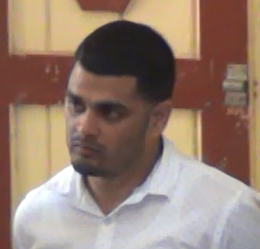The Guyana Bank for Trade and Industry (GBTI) followed protocol by reporting the allegedly fraudulent transaction by gold dealer, Saddiqi Rasul to the police, Head of the Financial Intelligence Unit (FIU), Matthew Langevine said yesterday.
“If a crime is committed against the bank they will automatically make a police report. If a fraud was committed a fraud report is made to the police… They (GBTI) followed protocol in reporting it to the police”, he said.
Following the publicity of the $941M fraud reportedly committed by Rasul, observers had questioned the FIU’s role in the matter. The FIU is an important component of the country’s anti-money laundering structure.

Langevine when contacted yesterday stressed that the FIU does not investigate crimes but rather deals with information from entities based on whether there is a perceived unusual transaction.
This information which comes from a variety of sources including banks, he said is then forwarded to the FIU for analytic purposes.
Langevine declined to comment specifically on the information the unit may have received about the Rasul matter, stating that he would not speak on specific cases.
“FIU’s role would be to receive information once there is a suspicious transaction”, he stressed adding that the FIU puts all the information together and analyzes it. On completion of this analytical process, he said the matter is sent to SOCU if an offence was found to have been committed.
Chairman of the Board of Directors Robin Stoby SC told those gathered at the bank’s Annual General Meeting on Monday that after the former Chief Executive Officer John Tracey was unable to have the customer repay the sum, on the direction of the board the matter was reported to the police and the customer was investigated by the fraud squad and subsequently charged with several offences.
Stoby explained to the shareholders that on or around March 24, 2017, the customer, who he did not name, was allowed access to a large sum representing the uncleared deposit of $941 million emanating from several cheques he purported to deposit to the Bartica branch that were drawn on Citizens Bank accounts he held.
He explained that the branch manager, without the approval of the CEO of the bank or any senior manager, allowed the transaction to take place and that the customer, knowing that his Citizens Bank account was frozen and that he had no funds, still presented the cheques.
It is unclear if the Citizen Bank account was frozen following a report either to the FIU or the Central Bank which is the reporting agency governing all commercial banks.
Rasul, the owner of SSS Minerals Trading, was on April 3 charged with six counts of fraud.
It was alleged that between March 21 and March 22, at Bartica, with intent to defraud, he obtained from GBTI $96 million, $290 million, $89 million, $45 million, $298 million and $138 million by falsely pretending that he had cash in a Citizens Bank account to honour cheques that he wrote.
He has denied the charges and is free on a total of $3M bail.
The FIU, according to its website, is an agency responsible for the requesting, receiving, analysing and disseminating of suspicious transaction reports and other information relating to money laundering, terrorist financing or proceeds of crime.
Among some of its key responsibilities is the compilation of reports for competent law enforcement authorities if there are reasonable grounds to suspect that transactions involve money laundering or are proceeds of crime or terrorist financing.
Banks, under the AML/CFT legislation, are required to submit Suspicious Activities Reports to the FIU.
According to the FIU website, “a reporting entity must pay special attention to all complex, unusual or large business transactions, whether completed or not, and to all unusual patterns of transactions and to insignificant but periodic transactions, which have no apparent economic or lawful purpose.”
It said that upon reasonable suspicion that a transaction may constitute or relate to money laundering, proceeds of crime or terrorist financing, a reporting entity must “promptly report the suspicious transaction to the Financial Intelligence Unit.”
The website states that where the reporting entity is a money transfer agency, it must report any money transfer over $200,000 and in instances where the reporting agency is a cambio, any purchase of over $400,000, and any sale over $1,000,000 and any cash transaction over $2,000,000.





